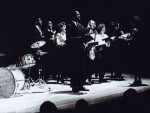Title
As a child of the ’60s, I have been privileged to draw upon personal involvement and experiences from this enriching period of America’s socio-economic transformation and development. During my adolescence in Chicago, my dad’s daily sacrifices in the steel industry and my mother’s endless days of challenges as an elementary-school mathematics instructor were saturated by the racist bias, bigotry, segregation, and societal inequality so prevalent throughout the bedrock of America’s communities.
Body
My memories of marches alongside my parents, relatives, fellow church members, and inhabitants of our community with Dr. King leading the procession were eternally placed within my psyche and provided a deeply-rooted seed that would be nurtured over time through my understanding of true brotherhood and involvement in the process of humanity and reciprocity. Music became a balm of truth and peace, providing a release and spiritual cleansing after the contrary sounds of hatred and conflict that would be witnessed and experienced among multi-ethnic people who chose to live righteously. So with the songs of my generation’s freedom fighters heard weekly through our attendance at Operation Breadbasket and Push/Excel (Jesse L. Jackson, Ralph Abernathy, Adam Clayton Powell, Bobby Rush, Dick Gregory, Cannonball Adderly, Nina Simone, and Aretha Franklin), along with the other voices that infused my journey to adulthood (Richard Wright, Alex Haley, Nelson Mandela, Barbara Jordan, Miles Davis, Mahalia Jackson, Stevie Wonder, and Andre Crouch), I found my purpose and inspiration to take an active step toward positive change.
As art reflects, retracts, and redefines, I have been thankful for the joy divinely expressed through my mission of music and the shared gifts of others who are invested in the message of love. This experience was given new birth in an artistic effort to recognize Martin Luther King’s legacy of goodwill to all mankind in The Juilliard School’s first commemorative celebration in January of 1989, structured and introduced with the creative assistance of Laurie A. Carter, then the director of student affairs and now vice president and general counsel, and President Joseph W. Polisi. This period of awakening in my postgraduate studies at Juilliard was intellectually stimulating and academically humbling, and the common thread of excellence through acceptance of and respect for our similarities and differences was the fabric for the tapestry which took place.
I cherish the diverse relationships that were built over time among my Juilliard peers, faculty, and staff, all of whom established lasting impressions in their contributions to the celebration, not only through the programmed selections, but most significantly their character and generosity, which permeated their creative persona. Compositions by colleague Robert Convery (including I Have a Dream for strings and voices); spiritual arrangements of Hall Johnson and Edward Boatner fervently sung by a young ensemble that included Audra McDonald and Kevin Short; dance-theater presentations choreographed by distinguished alumni Ronald Taylor and Ronald Wright; and the timeless rendering of Reverend King’s “I Have a Dream” speech recited by an enthralling Trellis Stepter, all found new ways of retelling stories that should never be forgotten.
Yet in the midst of a technological renaissance in the 21st century, including scientific wonders, advancements, and endless innovation available to the world at large, we all are still subject to the injustices of famine, racial profiling, accelerated warfare, substandard economic resources for quality education and healthcare, and deprivation of the human spirit. The dream has not yet been fulfilled, and the drum major’s call is often muffled by the deafening voices of doubt and defeat.
However, as long as hope remains planted in the hearts of courageous victors, unashamed to stand against the popular and willing to go the distance for fairness and inclusion—whether in literature, in Congress, on the Carnegie Hall stage, or in every home around the dinner table with parent and child—Dr. King’s legacy of agape love will be realized and passed on to future generations, as they sing, dance, speak, and breathe.





